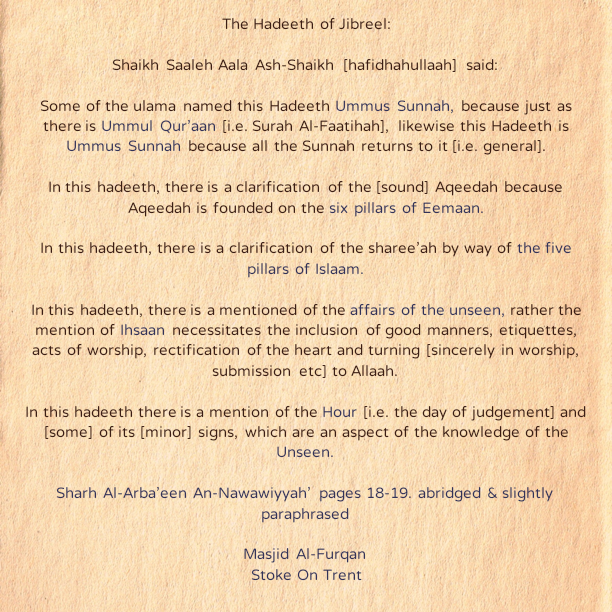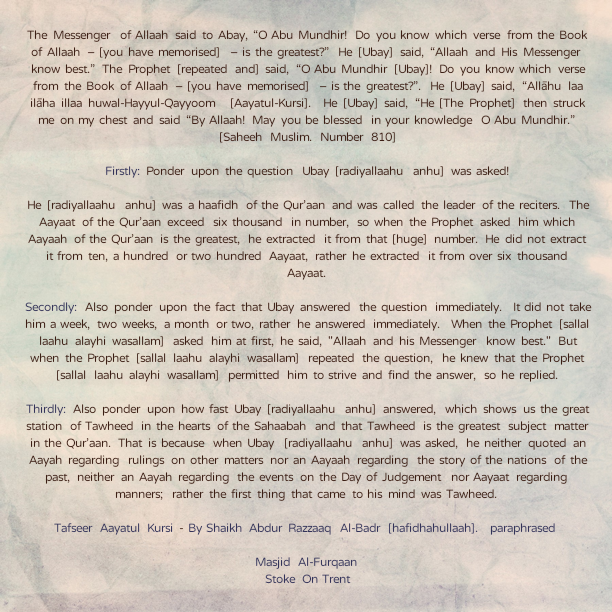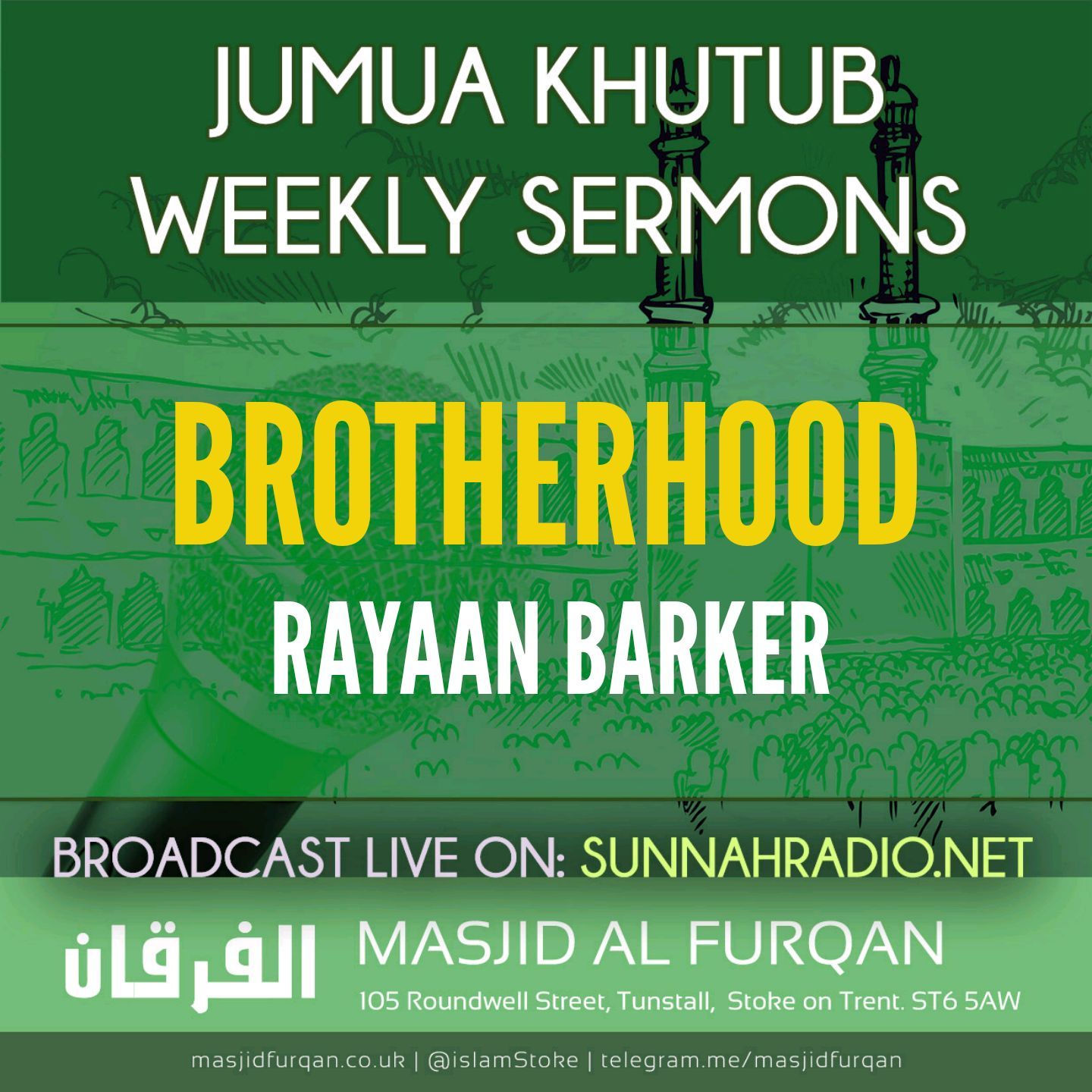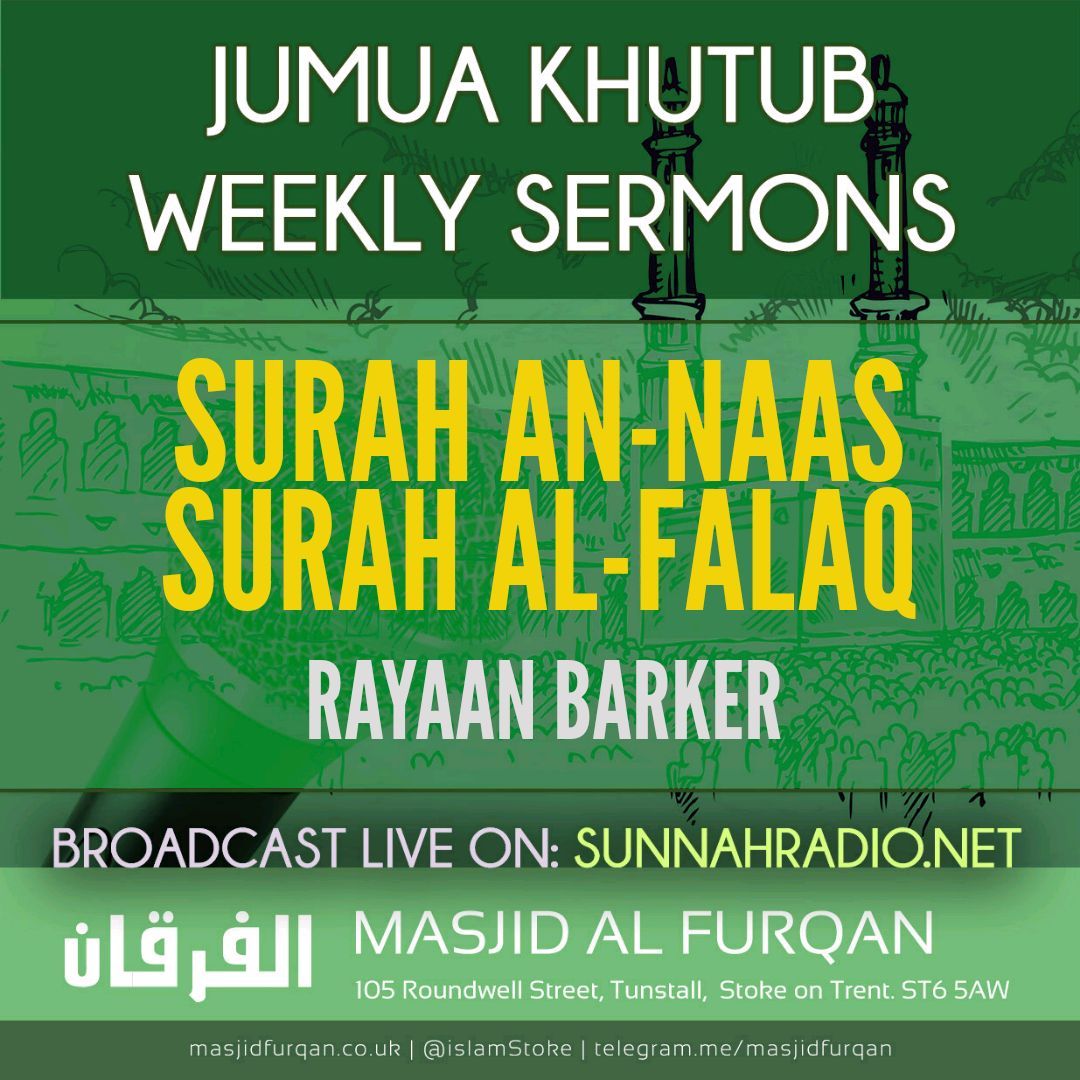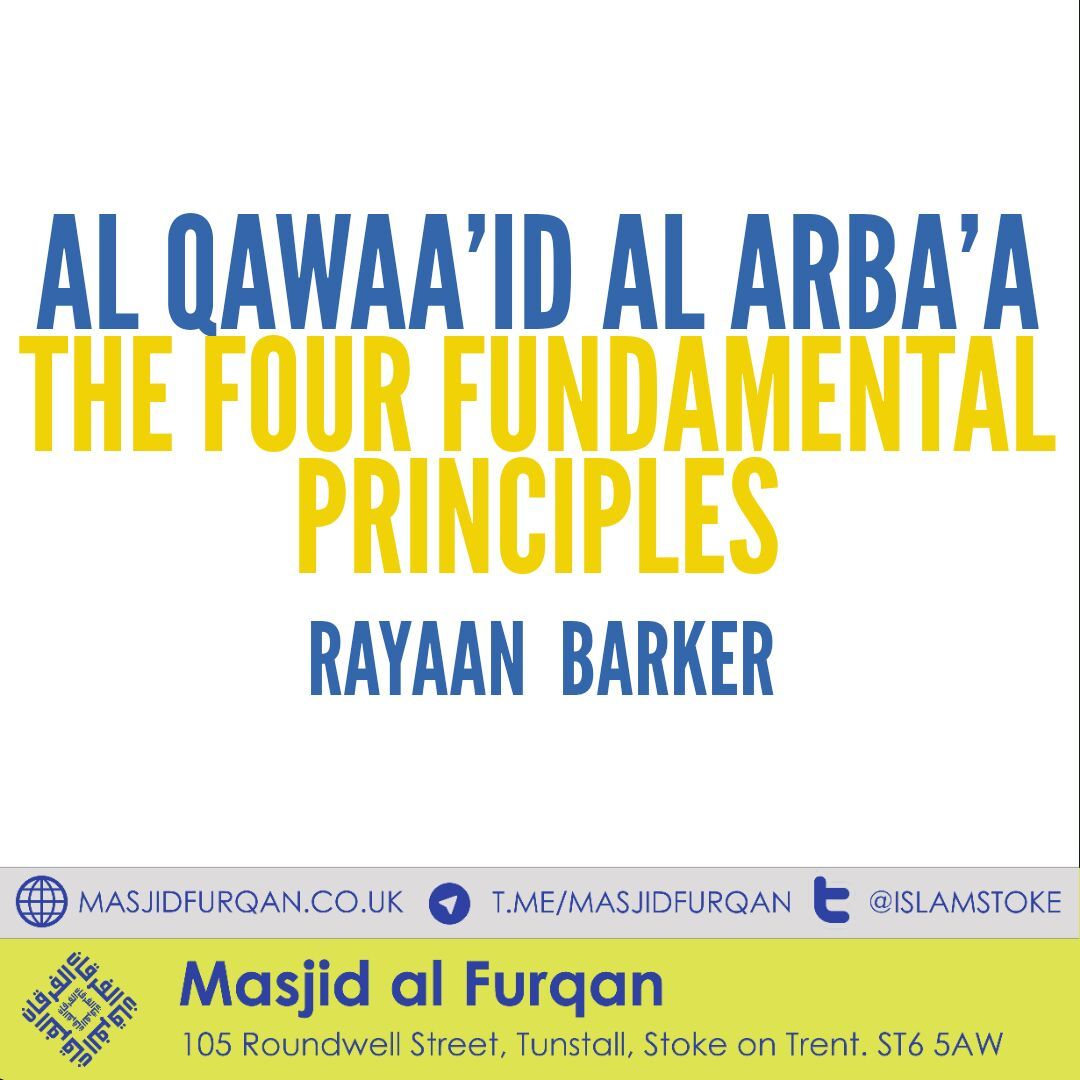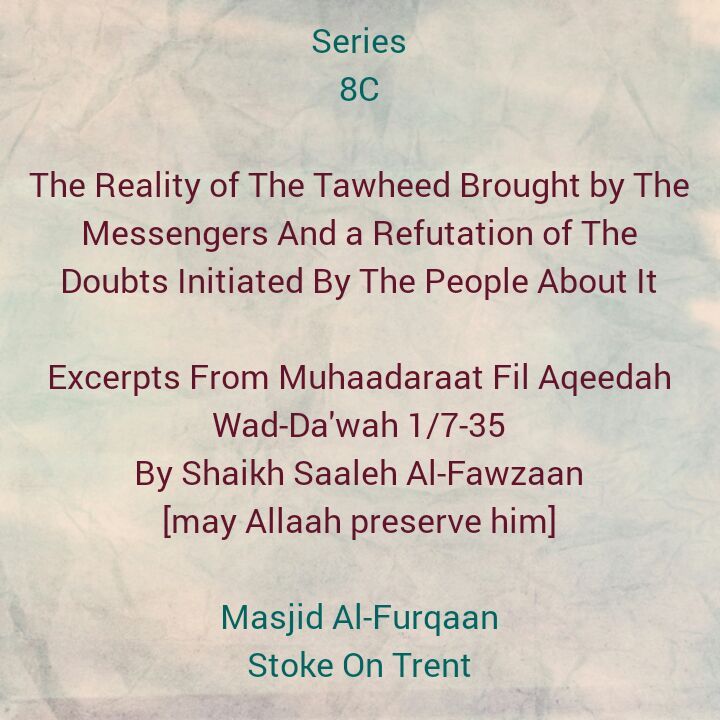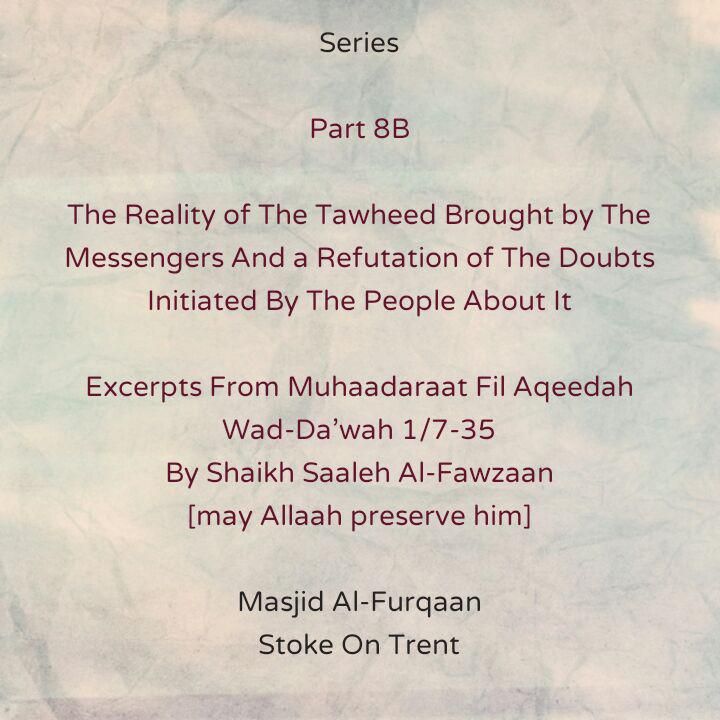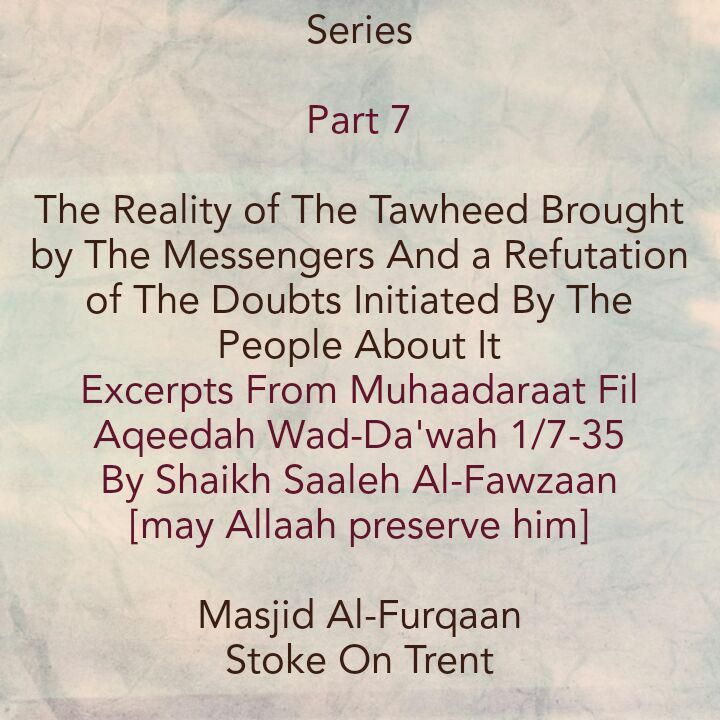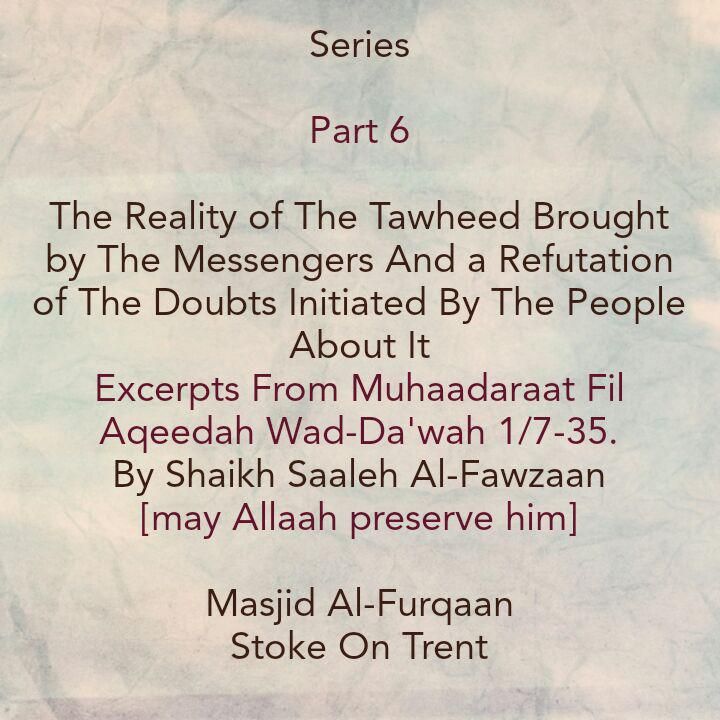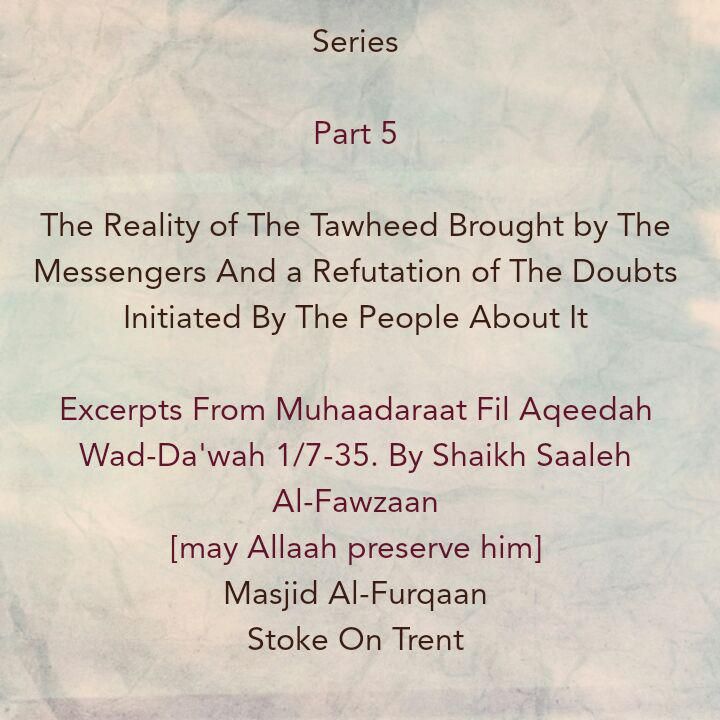Tag: tawheed
When The Prophet Asked Ubay, ” Which Aayah In The Qur’aan Is The Greatest?” The Response He Gave Shows Us The Lofty Station of Tawheed In The Hearts of The Sahaabah – [By Shaikh Abdur Razzaaq Al-Badr (Hafidhahullaah)]
Written by Abdullah Jallow on . Posted in Belief - 'Aqeedah', Monotheism - Tawheed, Purification of The Soul, Qur'aan, Worship - 'Ibaadah'.
In The Name of Allaah, The Most Merciful, The Bestower of Mercy
The Messenger of Allah said to Abay, “O Abu Mundhir! Do you know which verse from the Book of Allah – [you have memorised] – is the greatest?” He [Ubay] said, “Allaah and His Messenger know best.” The Prophet [repeated and] said, “O Abu Mundhir [Ubay]! Do you know which verse from the Book of Allaah – [you have memorised] – is the greatest?”. He [Ubay] said, “Allāhu laa ilāha illa huwal-Hayyul-Qayyoom [Aayatul-Kursi]. He [Ubay] said, “He [The Prophet] then struck me on my chest and said “By Allah, may you be blessed in your knowledge O Aba Mundhir.” [Muslim, hadith no.810]
Firstly: Ponder upon the question Ubay [radiyallaahu anhu] was asked!
He [radiyallaahu anhu] was a haafidh of the Qur’aan and was called the leader of the reciters. The Aayaat of the Qur’aan exceed six thousand in number, so when the Prophet asked him which Aayaah of the Qur’aan is the greatest, he extracted it from that [huge] number. He did not extract it from ten, a hundred or two hundred Aayaat, rather he extracted it from over six thousand Aayaat.
Secondly: Ponder upon the fact also that Ubay answered the question immediately. It did not take him a week, two weeks, a month or two, rather he answered immediately. When the Prophet [sallal laahu alayhi wasallam] asked him at first, he said, “Allaah and his Messenger know best.” But when the Prophet [sallal laahu alayhi wasallam] repeated the question, he knew that the Prophet [sallal laahu alayhi wasallam] permitted him to strive and find the answer, so he replied.
Thirdly: Also ponder upon how fast Ubay [radiyallaahu anhu] answered, which shows us the great station of Tawheed in the hearts of the Sahaabah and that Tawheed is the greatest subject matter in the Qur’aan. That is because when Ubay [radiyallaahu anhu] was asked he did not quote an Aayah regarding rulings on other matters nor an Aayaah regarding the story of the nations of the past, nor an Aayah regarding the events on the Day of Judgement, nor Aayaat regarding manners, rather the first thing that came to his mind was Tawheed.
http://al-badr.net/sub/29
Khutba: Brotherhood
Written by Masjid Furqan on . Posted in Announcements, Khutbah (Friday Sermons).
In this Khutbah Ustaadh Rayaan gives us some essential advice regarding the importance of being united. This unity must be founded upon the way the Salaf us-Salhih. The way of Tawheed and Eemaan in Allaah!
We find that the Arab tribes were divided and they used to harm each other for the very smallest of affairs. Islam came to call them to Tawheed, to the worship of Allaah alone and to rectify the hearts & soluls to be sincere to Allaah.
Islam and Eemaan changed them and they became brothers.
KHUTBA: Surah al-Falaq & an-Naas | Rayaan Barker
Written by Masjid Furqan on . Posted in Announcements, Khutbah (Friday Sermons).
‘Uqbah bin ‘Amir (May Allaah be pleased with him) reported:
The Messenger of Allaah (salla llaahu ‘alaihi wa sallam) said: “Do you not know that last night certain Ayat were revealed the like of which there is no precedence. They are: ‘Say: I seek refuge with (Allaah) the Rabb of the daybreak’ (Surah 113), and ‘Say: I seek refuge with (Allaah) the Rabb of mankind’ (Surah 114).”
[Muslim].
The Four Fundamental Principles | Rayaan Barker
Written by Masjid Furqan on . Posted in Announcements, Lessons.
In this series, Ustaadh Rayaan goes through the treatise The Four Principles written by Shaykh ul Islaam Muhammad ibn Abdul Wahaab. They relate to Tawhid and Shirk.
Tawhid refers to the fact that there is none who has the right to be worshipped except Allah alone, and that is the purpose behind the creation of humankind and Jinn as well as the primary purpose behind the sending of the Prophets and Messengers.
Shirk is the opposite of Tawhid and its nullifier. It is to direct worship to other than Allahh. The author states the grievous sin of Shirk and how many Muslims in later times fell into polytheistic practices such as supplicating to the deceased in their graves and depending upon them for salvation.
The principles are not based upon mere personal deductions, rather they are taken from the Qur’aan and the Sunnah of the Prophet ﷺ.
Below is the study booklet for these lectures which you may download and make your own notes:
[8C] The Reality of The Tawheed Brought By The Messengers -[A Short Rebuttal Against The Doubt: Shirk Will Not Occur In The Ummah]
Written by Masjid Furqan on . Posted in Belief - 'Aqeedah', Deviated Groups, Sects and Parties, Monotheism - Tawheed, Purification of The Soul, Worship - 'Ibaadah'.
In The Name of Allaah, The Most Merciful, The Bestower of Mercy
Among their Shubhah [i.e. doubts portrayed as truth but are falsehood in reality] is the claim that Shirk will not occur in the Ummah of Muhammad [sallal-laahu-alayhi-wasallam] whilst they still testify that there is no deity worthy of worship except Allaah and that Muhammad [sallal-laahu-alayhi-wasallam] is the Messenger of Allaah, and that what has taken place between them [i.e. grave worshippers] and the Awliyaa [i.e. worshipping the graves of the awliyaa] is not tantamount to Shirk.
Response to this Shubhah: Indeed, the Prophet [sallal laahu alayhi wasallam] informed us that certainly the doubts of the Yahood and Nasaaraa will occur in this Ummah, such as the fact that they [i.e. Yahood and Nasaaraa] took their rabbis and monks as lords besides Allaah. [Refer to explanation of this affair in the following links: https://learnaboutislam.co.uk/k-tawheed50-nigeria/ http://www.abukhadeejah.com/ahmad-an-najmees-kitaab-at-tawheed-chapter-5-the-explanation-of-tawheed-and-the-shahaadah-laa-ilaaha-illallaah/ ]
The Prophet [sallal laahu alayhi wasallam] said, ‘’You will certainly follow the ways of those who came before you- hand span by hand span, cubit by cubit, to the extent that if they entered a lizard’s hole, you will also enter it.’’ We [i.e. the Sahaabah] said, ‘O Messenger of Allaah! Is it the Yahood and Nasaaraa?’ He said, ‘Who else?’ ‘’
[Al-Bukhaari’ Number 1397]
Therefore, the Prophet [sallal-laahu-alayhi-wasallam] informed us that some of the people in his Ummah will do what the previous nations did [i.e. misguidance] in religion, customs and the ways in which they govern their affairs. Indeed, shirk occurred in the nations of the past and likewise it has occurred in this Ummah. Indeed, what the Prophet [sallal-laahu-alayhi-wasallam] told us has occurred, for here [i.e. various places in the Muslim lands] are the graves being worshipped besides Allaah with various types of worship. And the Prophet [sallal-laahu-alayhi-wasallam] informed us that the end of time will not come until a part of his Ummah attach themselves to the Mushrikoon and until groups from his Ummah worship idols. [Abu Dawud 4252]
Muhaadaraat Fil Aqeedah Wad-Da’wah’ pages 23-24. Abridged and slightly paraphrased
[8B] The Reality of The Tawheed Brought By The Messengers -[Merely Saying The Shahaadah Will Not Enter a Person In Paradise Unless He [or She] Fulfils Its Conditions]
Written by Masjid Furqan on . Posted in Belief - 'Aqeedah', Calling To Islam - 'Da'wa', Monotheism - Tawheed, Purification of The Soul, Worship - 'Ibaadah'.
In The Name of Allaah, The Most Merciful, The Bestower of Mercy
Among their [doubts which they portray as truth but are falsehood in reality] is that by merely saying ‘There is no deity worthy of worship except Allaah’, it is enough to enter a person in paradise, even if the person commits disbelief and polytheistic acts. They [hold this view due to their (wrong) understanding of] the Ahaadeeth that have been transmitted regarding this affair – that whoever says that ‘There is no deity worthy of worship except Allaah’, the fire has been made forbidden [for him].
Response to this doubt: The Ahaadeeth that have been mentioned [i.e. regarding this affair] are attributed to a person who says, ‘There is no deity worthy of worship except Allaah’, then he dies upon such a state and did not negate it by committing shirk; rather he said it sincerely from the bottom of his heart whilst disbelieving in [everything] that is worshipped besides Allaah and dies upon this state. It’baan [radiyallaahu-anhu] said [that the Messenger (sallal-laahu-alayhi-wasallam) said], ‘’Allaah has forbidden the (Hell) fire for the one who say, ‘There is no deity worthy of worship except Allaah’ for seeking Allaah’s Countenance (i.e. for Allaah’s sake only).’’’ [Bukhaari’ Hadeeth 425] [Source: Muhaadaraat Fil Aqeedah Wad-Da’wah’ page 22-23. abridged and slightly paraphrased]
Must Read: http://www.abukhadeejah.com/the-muslim-testimony-of-faith-shahadah-and-its-conditions-islam-2-2/
[7] The Reality of The Tawheed Brought By The Messengers -[The Mushrikoon of Old Had a Better Understanding of The Shahaadah Than The Grave Worshippers of Today]
Written by Masjid Furqan on . Posted in Belief - 'Aqeedah', Calling To Islam - 'Da'wa', Deviated Groups, Sects and Parties, Purification of The Soul, Worship - 'Ibaadah'.
In The Name of Allaah, The Most Merciful, The Bestower of Mercy
Laa Ilaaha Ilal laah – There is no deity worthy of worship except Allaah – is a declaration of Tawheed Al-Ibaadah [i.e. to single Allaah out in worship]. Therefore, whoever says this statement, knows its meaning, acts upon what it necessitates by negating shirk and affirming that Allaah alone is the true deity worthy of worship and believes in that, then he [or she] is a true Muslim.
And whoever says this statement and acts upon what it necessitates – outwardly; but does not believe in it -in his heart, then he [or she] is a hypocrite.
And whoever says this statement, but acts in opposition to it by committing shirk [Ref 1]– negating what it necessitates, he [or she] is a disbeliever, even if he [or she] repeats this statement many times. [Ref 2] [NB: Before continuing, the reader must bear in mind that the statements in [references 1 and 2 above] requires elaboration, therefore the reader must refer to their links at the end of this article].
This is the state of the grave worshippers of today – those who say this statement, but neither do they understand its meaning nor does it have any effect on their acts of worship; so, you see one of them saying, “There is no deity worthy of worship except Allaah”, but then he also says, “O Abdul Qaadir [i.e. Abdul Qaadir Jaylaani]! Grant me aid and assistance. O Badawi! O such and such.” He appeals to the dead people and seeks their help when faced with afflictions. [Ref 3]
Indeed, the polytheists of the earlier era had a better understanding of Laa ilaaha ilal laah than these people [i.e. the grave worshippers of our era], because when the Messenger [sallal laahu alayhi wasallam] said to them, “Say (i.e. testify) that ”There is no deity worthy of worship except Allaah”, they knew that he was commanding them to abandon idol worship and to worship Allaah alone; so, this why -as Allaah informed us- they said:
[أَجَعَلَ ٱلۡأَلِهَةَ إِلَـٰهً۬ا وَٲحِدًاۖ إِنَّ هَـٰذَا لَشَىۡءٌ عُجَابٌ۬ – Has he (i.e. Muhammad) made the aliha (gods) (all) into One Ilah (God – Allah). Verily, this is a curious thing!” [Surah Saad’ Aayah 5]
And [Allaah informed us that the] people of Hud said: أَجِئۡتَنَا لِنَعۡبُدَ ٱللَّهَ وَحۡدَهُ ۥ وَنَذَرَ مَا ڪَانَ يَعۡبُدُ ءَابَآؤُنَاۖ- You have come to us that we should worship Allah Alone and forsake that which our fathers used to worship. [Surah Al- A’raaf’ Aayah 70]
And [Allaah informed us that the people of Saaleh] said: [أَتَنۡهَٮٰنَآ أَن نَّعۡبُدَ مَا يَعۡبُدُ ءَابَآؤُنَا – Do you (now) forbid us the worship of what our fathers have worshipped? [Surah Hud’ Aayah 62]
And [Allaah informed us that] the people of Nuh said:
وَقَالُواْ لَا تَذَرُنَّ ءَالِهَتَكُمۡ وَلَا تَذَرُنَّ وَدًّ۬ا وَلَا سُوَاعً۬ا وَلَا يَغُوثَ وَيَعُوقَ وَنَسۡرً۬ا
“And they have said: ‘You shall not leave your gods, nor shall you leave Wadd, nor Suwa’, nor Yaghuth, nor Ya’uq, nor Nasr (names of the idols). [Surah Nuh’ Aayah 23]
So, this is how the disbelievers of old understood Laa ilaaha illal laah – that it necessitates the abandonment of idol worship and that Allaah alone is to be worshipped. And because of this, they refused to utter it because it can’t be in harmony with worshipping laat, uzzaa and manaat. The grave worshippers of today do not realise this contradiction, so they say Laa ilaaha illal laah whist worshipping the dead.
[Source: Muhaadaraat Fil Aqeedah Wad-Da’wah’ 1/16-17. Abridged & slightly paraphrased]
Ref1: Types of shirk: http://www.abukhadeejah.com/ahmad-an-najmees-kitaab-at-tawheed-chapter-3-fear-of-falling-into-shirk/
Ref2: Takfeer [i.e. declaring a specific individual to be outside the fold of Islaam is carried out by the scholars based on clear principles. See links about Takfeer and excuse of ignorance by Shaikh Saaleh Al-Fawzaan]:
http://www.salafipublications.com/sps/sp.cfm?subsecID=MNJ09&articleID=MNJ090004&articlePages=1
[6] The Reality of The Tawheed Brought By The Messengers -[The First Command In The Mus’haf And Prophet Ibraaheem’s Declaration to His People]
Written by Masjid Furqan on . Posted in Belief - 'Aqeedah', Calling To Islam - 'Da'wa', Purification of The Soul, Qur'aan, Worship - 'Ibaadah'.
In The Name of Allaah, The Most Merciful, The Bestower of Mercy
Shaikh Saaleh Al-Fawzaan [may Allaah preserve him] said:
The first command in the Mus’haf is the statement of Allaah [The Most High]:
يَـٰٓأَيُّہَا ٱلنَّاسُ ٱعۡبُدُواْ رَبَّكُمُ ٱلَّذِى خَلَقَكُمۡ وَٱلَّذِينَ مِن قَبۡلِكُمۡ لَعَلَّكُمۡ تَتَّقُونَ
ٱلَّذِى جَعَلَ لَكُمُ ٱلۡأَرۡضَ فِرَشً۬ا وَٱلسَّمَآءَ بِنَآءً۬ وَأَنزَلَ مِنَ ٱلسَّمَآءِ مَآءً۬ فَأَخۡرَجَ بِهِۦ مِنَ ٱلثَّمَرَٲتِ رِزۡقً۬ا لَّكُمۡۖ فَلَا تَجۡعَلُواْ لِلَّهِ أَندَادً۬ا وَأَنتُمۡ تَعۡلَمُونَ
O mankind! Worship your Lord (Allah), Who created you and those who were before you so that you may become Al-Muttaqun (the pious) – Who has made the earth a resting place for you, and the sky as a canopy, and sent down water (rain) from the sky and brought forth therewith fruits as a provision for you. Then do not set up rivals unto Allah (in worship) while you know (that He Alone has the right to be worshipped). [Surah Al-Baqarah’ Aayaat 21-22]
The statement ‘There is no deity worthy of worship except Allaah’ necessitates ‘negation’ and ‘affirmation’. Negating every other thing worshipped besides Allaah because they are not worthy of worship, and affirming that Allaah alone is the true deity worthy of worship. The religion of Tawheed is founded upon these two foundations, just as Allaah stated that Ibraaheem [alayhis salaam] said to his people:
وَإِذۡ قَالَ إِبۡرَٲهِيمُ لِأَبِيهِ وَقَوۡمِهِۦۤ إِنَّنِى بَرَآءٌ۬ مِّمَّا تَعۡبُدُونَ
إِلَّا ٱلَّذِى فَطَرَنِى فَإِنَّهُ ۥ سَيَہۡدِينِ
And (remember) when Ibrahim (Abraham) said to his father and his people: “Verily, I am innocent of what you worship; Except Him (i.e. I worship none but Allah Alone) Who did create me, and verily, He will guide me.”
[Surah Az-Zukhruf’ Aayaat 26-27]
This was the path of every Messenger sent by Allaah [to the people]. Allaah [The Most High] said:
وَلَقَدۡ بَعَثۡنَا فِى ڪُلِّ أُمَّةٍ۬ رَّسُولاً أَنِ ٱعۡبُدُواْ ٱللَّهَ وَٱجۡتَنِبُواْ ٱلطَّـٰغُوتَۖ
And verily, We have sent among every Ummah (community, nation) a Messenger (proclaiming): “Worship Allah (Alone), and avoid (or keep away from) Taghut (all false deities, etc. i.e. do not worship Taghut besides Allah).” [Surah An-Nahl’ Aayah 36]
Allaah [The Most High] said:
فَمَن يَكۡفُرۡ بِٱلطَّـٰغُوتِ وَيُؤۡمِنۢ بِٱللَّهِ فَقَدِ ٱسۡتَمۡسَكَ بِٱلۡعُرۡوَةِ ٱلۡوُثۡقَىٰ لَا ٱنفِصَامَ لَهَاۗ
Whoever disbelieves in Taghut and believes in Allah, then he has grasped the most trustworthy handhold that will never break.
[Surah Al-Baqarah’ Aayah 256]
Whoever says that ‘There is no deity worthy of worship except Allaah’ has indeed declared his freedom from every other thing worshipped besides Allaah and obligated on himself [or herself] to worship Allaah [alone]. This is a covenant obligated by a person on himself [or herself]. [Allaah (The Most High) said]:
فَمَن نَّكَثَ فَإِنَّمَا يَنكُثُ عَلَىٰ نَفۡسِهِۦۖ وَمَنۡ أَوۡفَىٰ بِمَا عَـٰهَدَ عَلَيۡهُ ٱللَّهَ فَسَيُؤۡتِيهِ أَجۡرًا عَظِيمً۬ا
Then whosoever breaks his pledge, breaks only to his own harm, and whosoever fulfills what he has covenanted with Allah, He will bestow on him a great reward.
[Surah Al-Fath’ Aayah 10]
Source; Muhaadaraat Fil Aqeedah Wad-Da’wah’ pages 15-16. Abridged and slightly paraphrased
[5]The Reality of The Tawheed Brought By The Messengers-[Affirmation of Tawheed Ar-Ruboobiyyah is Not Enough, Because Even The Mushrikoon Affirmed It]
Written by Masjid Furqan on . Posted in Belief - 'Aqeedah', Calling To Islam - 'Da'wa', Purification of The Soul, Worship - 'Ibaadah'.
In The Name of Allaah, The Most Merciful, The Bestower of Mercy
Shaikh Saaleh Al-Fawzaan [may Allaah preserve him] said:
Indeed, Tawheed is of two types: Tawheed Fil Ma’rifah Wal Ith’baat and it is Tawheed Ar-Ruboobiyyah [ref 1], which includes affirmation that Allaah alone is the Creator, the One in control over the entire affairs of the universe, the giver of life and death, the One who bestows all good and repels harm. The polytheists used to affirm [this category of Tawheed] even though they associated partners with Allaah in worship, just as Allaah [The Most High] stated about them:
قُلۡ مَن يَرۡزُقُكُم مِّنَ ٱلسَّمَآءِ وَٱلۡأَرۡضِ أَمَّن يَمۡلِكُ ٱلسَّمۡعَ وَٱلۡأَبۡصَـٰرَ وَمَن يُخۡرِجُ ٱلۡحَىَّ مِنَ ٱلۡمَيِّتِ وَيُخۡرِجُ ٱلۡمَيِّتَ مِنَ ٱلۡحَىِّ وَمَن يُدَبِّرُ ٱلۡأَمۡرَۚ فَسَيَقُولُونَ ٱللَّهُۚ فَقُلۡ أَفَلَا تَتَّقُونَ
Say (O Muhammad): “Who provides for you from the sky and from the earth? Or who owns hearing and sight? And who brings out the living from the dead and brings out the dead from the living? And who disposes the affairs?” They will say: “Allah.” Say: “Will you not then be afraid of Allah’s Punishment (for setting up rivals in worship with Allah)?” [Surah Yoonus’ Aayah 31]
The likes of these Aayaat are many and in them are clear clarifications that the polytheists used to affirm this category of Tawheed, but they used to wilfully deny the other category- Tawheed Al Ibaadah, which is to single out Allaah in Talab and Qasd [ref 2] in every act of worship, and this necessitates the statement ‘there is no deity worthy of worship except Allaah’.
And because of this, the Prophet [sallal laahu alayhi wasallam] asked the polytheists to testify and believe that there is no deity worthy of worship except Allaah, but [Allaah said that they replied]: [أَجَعَلَ ٱلۡأَلِهَةَ إِلَـٰهً۬ا وَٲحِدًاۖ إِنَّ هَـٰذَا لَشَىۡءٌ عُجَابٌ۬- Has he (i.e. Muhammad-sallal laahu alayhi-wasallam) made the aliha (gods) (all) into One Ilah (God – Allah). Verily, this is a curious thing!” [Surah Saad’ Aayah 5]
[That is] because they knew that whoever says this [i.e. Laa ilaaha Ilal laah], then indeed he has acknowledged that everything worshipped besides Allaah is false and affirmed that only Allaah has the right to be worshipped; because the meaning of Al-Ilaa [i.e. god] is Al-Ma’bood [i.e. an object of worship]. As for worship, it is a comprehensive term for everything that Allaah loves and is pleased with- [including] statements and actions, whether inward [i.e. acts of worship of the heart, such as love, fear, hope etc] or outward [i.e. apparent acts of worship carried out by the limbs].
Therefore, whoever utters this statement Laa Ilaaha illal laah [i.e. there is no deity worthy of worship except Allaah], but then he invokes others besides Allaah, indeed he has contradicted himself. An affirmation of Tawheed Ar-Ruboobiyyah [ i.e. that Allaah alone is the Creator, the One in control over the entire affairs of the universe, the giver of life and death, the One who bestows all good and repels harm] necessitates that a person should also affirm in his heart and by way of his actions that Allaah alone is the deity worthy of worship. And due to this, the Messengers used to command their nations to affirm that Allaah alone is the deity worthy of worship by reminding them about what they have already affirmed regarding Tawheed Ar-Ruboobiyyah, just as Allaah [The Most High] said:
ذَٲلِڪُمُ ٱللَّهُ رَبُّكُمۡۖ لَآ إِلَـٰهَ إِلَّا هُوَۖ خَـٰلِقُ ڪُلِّ شَىۡءٍ۬ فَٱعۡبُدُوهُۚ وَهُوَ عَلَىٰ كُلِّ شَىۡءٍ۬ وَڪِيلٌ۬
Such is Allah, your Lord! La ilaha illa Huwa (none has the right to be worshipped but He), the Creator of all things. So, worship Him (Alone), and He is the Wakil (Trustee, Disposer of affairs, Guardian, etc.) over all things. [Surah Al-An’aam’ Aayah 102]
[Allaah (Th Most High) said]:
وَلَٮِٕن سَأَلۡتَهُم مَّنۡ خَلَقَ ٱلسَّمَـٰوَٲتِ وَٱلۡأَرۡضَ لَيَقُولُنَّ ٱللَّهُۚ قُلۡ أَفَرَءَيۡتُم مَّا تَدۡعُونَ مِن دُونِ ٱللَّهِ إِنۡ أَرَادَنِىَ ٱللَّهُ بِضُرٍّ هَلۡ هُنَّ كَـٰشِفَـٰتُ ضُرِّهِۦۤ أَوۡ أَرَادَنِى بِرَحۡمَةٍ هَلۡ هُنَّ مُمۡسِكَـٰتُ رَحۡمَتِهِۦۚ
And verily, if you ask them: “Who created the heavens and the earth?” Surely, they will say: “Allah (has created them).” Say: “Tell me then, the things that you invoke besides Allah, if Allah intended some harm for me, could they remove His harm, or if He (Allah) intended some mercy for me, could they withhold His Mercy?”
[Surah Az-Zumar’ Aayah 38]
[Source: Muhaadaraat Fil Aqeedah Wad-Da’wah’ pages 11-12. Abridged and slightly paraphrased]
Refs 1 & 2, see article for further detail
http://www.salafipublications.com/sps/sp.cfm?subsecID=MNJ07&articleID=MNJ070003&articlePages=1

